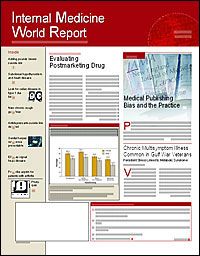New Challenges in Asthma Management in Primary Care
Novel Practice Parameters Urge Complete Control
ANAHEIM, Calif?Primary care physicians in the United States are facing more hurdles than ever before when attempting to effectively treat and manage patients with asthma, Myron Zitt, MD, president of the American College of Allergy, Asthma & Immunology, and associate professor of clinical medicine at the State University of New York, Stony Brook, said at the recent annual meeting. There are too many limitations about whom physicians can refer their patients to, and many patients with difficult-to-manage asthma cannot be referred at all.
Current guidelines do not adequately address these and many other issues, Dr Zitt noted, particularly the lack of effective management parameters for patients who have mild intermittent asthma. These individuals have very hyperreactive airways and require more aggressive care. However, new practice recommendations call for treating these patients only with a re?liever medication, such as a broncho?di?la?tor.
Dr Zitt contends that this is far from adequate therapy for such patients, and that the guidelines need to be changed. "Another problem is that some of the medications that may be necessary for treating asthma are not necessarily available to all patients. Formularies are limited, so that certain medications can't be used even though they may be more essential," Dr Zitt told IMWR.
The new practice parameters were also published in the Journal of Allergy & Immunology (2005;116:S3-S11) and were built upon the guidelines for the diagnosis and management of asthma developed by the National Heart, Lung, and Blood Institute (NHLBI). The new parameters call for the assessment of asthma at each physician visit to determine whether it is well controlled.
"Asthma is a chronic disease and needs to be continually reassessed," said lead author James T. Li, MD, PhD, of the Mayo Clinic College of Medicine, Roches?ter, Minn. "Every doctor or clinic visit should consist of a detailed assessment to determine if the patient's asthma is or is not under control. People with asthma should not be satisfied with less than well controlled or completely controlled asthma."
The NHLBI guidelines recommend measurements to develop a baseline classification of asthma severity before treatment begins. The new practice parameters recommend making asthma management decisions on an ongoing basis to determine the patient's level of control over the disease.
Dr Li and colleagues define complete control as:
? Full exercise activity
? No asthma symptoms during the day or night
? No use of "as-needed" albuterol
? No missed school or work
? Normal lung function
In addition, the new practice parameters recommend that asthma management be individualized, since each patient reacts differently to a particular medication. If asthma is completely or well controlled, patients may be able to proceed to "step-down therapy" and take fewer med?i?cations. Uncontrolled asthma re?quires a "step-up therapy," which may consist of more drugs and/or more frequent physician visits.
"Asthma is not a static disease, and each patient reacts differently to medication, their environment, triggers, and changing allergens that affect their ?asthma symptoms," said Dr Li. "Assessing these changes requires strong communication between the doctor and patient on an ongoing basis to determine whether changes are needed in medication?either an increase or a decrease."
The new practice parameters assert that well- or completely controlled asthma is not only possible, but that asthma sufferers should expect it.
